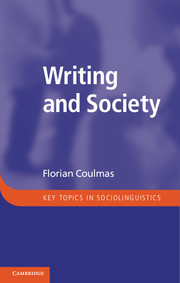Book contents
- Frontmatter
- Contents
- List of illustrations
- List of tables
- Preface
- Acknowledgements
- 1 The tyranny of writing and the dominance of vernacular speech
- 2 The past in the present and the seeds of the public sphere
- 3 Written and unwritten language
- 4 Literacy and inequality
- 5 The society of letters
- 6 Writing reform
- 7 Writing and literacy in the digitalized world
- Notes
- Bibliography
- Index
5 - The society of letters
Published online by Cambridge University Press: 05 February 2013
- Frontmatter
- Contents
- List of illustrations
- List of tables
- Preface
- Acknowledgements
- 1 The tyranny of writing and the dominance of vernacular speech
- 2 The past in the present and the seeds of the public sphere
- 3 Written and unwritten language
- 4 Literacy and inequality
- 5 The society of letters
- 6 Writing reform
- 7 Writing and literacy in the digitalized world
- Notes
- Bibliography
- Index
Summary
The advanced forms of human civilization, like universities and like governments and like national elections – all of those require writing.
(John Searle 2005)Written language in institutions
The institutions of modern society depend on writing and many are associated with a particular variety of written language. Taken together they constitute the society of letters as a community. This chapter examines three institutional settings which define frame conditions for certain kinds of connections to come into existence and certain kinds of communicative behaviour to take place: government, religion and school. Modern society is based on the dissociation of word and speaker by means of writing. Rare is the day when people do not interact in writing with public institutions, educational authorities, economic agents or religious bodies. Institutions as we know them have a history and write their own history by producing new documents every day. No government can function without rules and laws laid down in writing; without issuing directives, statements and explanations; without drawing up a budget and justifying expenditure. In religions, based on a holy text, the written word has a normative function in relation to the sermon and other oral expressions of faith. Although ‘the three Rs’ is a somewhat dated notion, the very existence of the institution of school is predicated on the need to instruct pupils in the arts of reading and writing, which, unlike oral language, are not usually acquired spontaneously. Many institutions are largely defined by documents such as statutes, contracts, bills, invoices, promissory notes, account ledgers, payslips, tax forms, scriptures, prayer books, curricula, primers, examination rules, term papers, dissertations and diplomas.
- Type
- Chapter
- Information
- Writing and SocietyAn Introduction, pp. 81 - 103Publisher: Cambridge University PressPrint publication year: 2013



